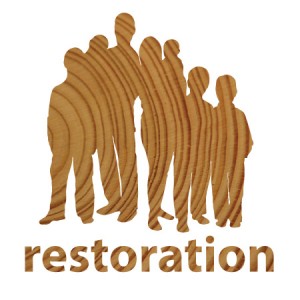One of the most exhausting parts of parenting young children is coming up with consequences that make sense. So today I’m sharing a discipline strategy that’s simple and crazy effective.
For years I agonized over just the right punishment when any of my children hurt a sibling or friend. It had to be
- a strong deterrent
- fair to both parties
- enforceable anytime and anywhere (because consistency isn’t my strong suit).
It turns out I wasted lots of time, energy and creativity, because my kids are way better at discipline than I am. Before you get the wrong idea, let me explain.
 In ancient Israel, anyone who committed an offense against another person had to make restitution. If I stole your donkey, I owed you a donkey, plus something extra for your trouble. The same was true if I lost or damaged your property, injured your body, or embarrassed you.
In ancient Israel, anyone who committed an offense against another person had to make restitution. If I stole your donkey, I owed you a donkey, plus something extra for your trouble. The same was true if I lost or damaged your property, injured your body, or embarrassed you.
This elegant solution still works for almost any offense, especially between siblings. So instead of deciding how serious the offense is or how harshly to discipline, all I do is remind the guilty party to ask the person they hurt this question:
“What do I owe you?”
That’s it. It’s ridiculously simple, but it works. (I wish I could take credit, but it’s straight from the book of Leviticus). In our family, depending on the offense, the injured party might ask the offender to do chores for them, give them their screen time for that day, or give them money. What’s amazing is that children as young as 3 are incredibly fair when it comes to taking anything from another child, even a child they’re angry with. They understand that one day the tables will be turned and they’ll be the one making restitution.
Even though they could say,”You owe me a million dollars”, they don’t. In my experience, the restitution the injured party suggests is fair, and the offender agrees over 90% of the time. The few times I’ve had to intervene, I’ve never done more than make a suggestion.
After restitution is paid, it’s over. Nobody brings it up again. If they do, we remind them the debt was paid, and that means the person is forgiven. Everyone experiences the tangible reality of forgiveness.
There are so many benefits to this approach. Here are few:
- kids are empowered to resolve their conflicts within a biblical framework
- everyone extends and receives forgiveness
- children feel more secure knowing justice will be done on their behalf
- less exhaustion for parents
- everyone takes responsibility for their actions
This process also complements the activity I described last week. Try them both and your family will experience less conflict, and be better equipped to deal with the conflicts that inevitably come up.
Now it’s your turn: When it comes to resolving conflict, what has worked for your family? Tell me about it in the comments below.

